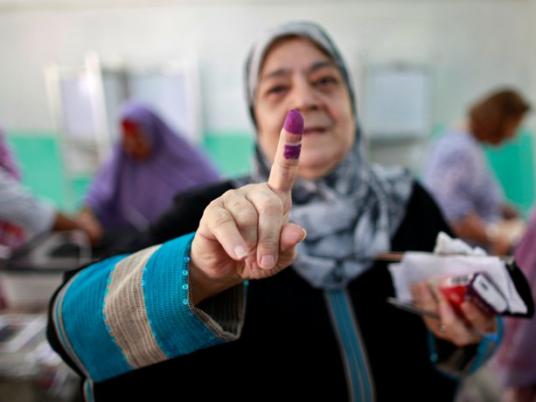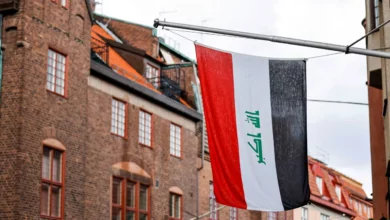The Egyptian media landscape will begin to break political taboos in the aftermath of the revolution, but it will not succeed in breaking religious taboos, and doubts over radical changes in the media landscape are strong.
During the 18 days when millions of Egyptians took to the streets, eventually forcing political strongman Hosni Mubarak to leave office, a war of images was taking place in which the pro-Mubarak media went on the offensive.
State-owned media as well as some private satellite channels portrayed the hundreds of thousands of protesters as a minority and systematically attacked the protesters, accusing them of having external “agendas” and working for foreign parties.
Recently, rights group, journalists and political activists have created a number of online sources documenting what they see as the forces that supported the regime of the former president.
The Arabic Network for Human Rights Information (ANHRI) launched a website with a blacklist of Egyptian journalists, artists and public figures who supported Mubarak and were against the popular revolution.
Meanwhile, one day after Mubarak’s resignation, state television issued a statement apologizing and backtracking from their pro-Mubarak coverage.
The statement congratulated “the Egyptian people for their pure, great revolution led by the best of the Egyptian youth."
“The mood of the television-watching Egyptian public veered from support of the protesters’ demands to a desire to return to normalcy to sympathy with the beleaguered president and back again,” wrote journalist Ursula Lindsey.
Within ten days, Egypt’s flagship paper Al-Ahram, which has the largest distribution in the nation, had changed its headline of “Millions are asking Mubarak to stay,” to "The people ousted the regime" on 12 February.
Political and religious taboos
Experts argue that the revolution will make it easier for the media to limit political taboos.
“Political red lines are decreasing because the forces that have been taking part in the revolution are imposing conditions and one of them was to force the state-run media to change its longstanding sympathy for Mubarak,” said Emad Mubarak, director of the Association for Freedom of Thought and Expression.
However, due to the relative tolerance of Egypt’s new military rulers for the Muslim Brotherhood, Mubarak believes religious taboos will continue.
“In 18 days of revolution you can’t tell that a massive social change has been taking place. The main characteristics of the Egyptian society concerning the religious views are still the same,” argued Mohamed Badaway a literary critic and professor at Cairo University.
Following the decision of Egypt's Supreme Armed Forces Council to form a committee to amend specific articles of the 1971 constitution, various political and social forces declared their rejection of any amendment to the provision concerning Islamic law as Egypt's source of legislation.
“Islam is the Religion of the State. Arabic is its official language, and the principal source of legislation is Islamic Jurisprudence (Sharia)," Article 2 of the Constitution reads.
The article has been under fierce discussions and debate, especially given the 10 percent Christian minority in Egypt that has often been marginalized.
On Wednesday, Al-Azhar Grand Sheikh Ahmed al-Tayyeb, the highest religious authority in the Sunni-Muslim world, said that Islamic law should remain the principle source of legislation in Egypt's post-Mubarak era.
On the same day, the Salafi movement in Egypt held its first public conference warning against any attempts to amend Article 2.
“There is consensus among a wide array of our contacts–politicians, academics, analysts, and "ordinary" Egyptians–that Salafism is on the rise, with some characterizing it as "a wave sweeping the country" and "nothing short of a major societal shift," according to a US diplomatic cable.
“These moves do tell you that religious conservatism is trying to dominate and the Egyptian masses that went to the street weren’t concerned with engaging critically with them,” argued Badaway. “The protesters were keen to show that religion can coexist with modern political demands and there were keen to keep a progressive image of religion.”
Changing the media landscape
Some experts believe that it’s too early to anticipate the implications of the revolution on the state-run media, especially during a transitional period that may not necessarily lead to true democratic changes.
“We are in an ambiguous situation where no radical changes are expected to be initiated by the military to change Egypt’s authoritative political system,” said Hassan Nafaa, professor of political science at Cairo University.
Nafaa suggested that Egypt is in need of another strategy based on a longer transitional period led by a civilian council headed by Defense Minister Mohamed Tantawi and a crisis coalition government.
Such strategy will lead all the components of civil society to negotiate for better political and economic benefits, according to Mubarak who went on to argue that “struggles with the state-run media are ongoing and we need time to see the outcomes of these struggles.”
Hundreds of Egyptian TV news desk employees and workers demonstrated for the first time against the flawed coverage of the revolution, forcing Egyptian Minister of Information Anas al-Feki to resign.
Journalists of the state-owned news agency (MENA) rallied against the pro-Mubarak editorial policy, accusing their editor-in-chief of corruption.
And employees at the Al-Gomhouriya daily and its evening paper Al-Masaa, as well as of the Rose al-Youssef newspaper, held a protest rally demanding changes in their editorial boards, new editors, and a revision of the publication policy to reflect the demands of the people.
Some 300 journalists from Al-Ahram sought to publish an apology to readers.
“They (pro-Mubarak editors) are in a deep crisis right now. They can’t get rid of their notorious stances against the revolution. Now because they are just hypocrites, they think that condemning Mubarak is enough for them to stay in their offices,” said Abdel Galil el-Sharnouby, editor-in-chief of the Muslim Brotherhood official website Islam Online.
However, state-run newspapers are not expected to face a radical change from within.
“Yes they (state-run media) are attacking Mubarak now, but this is because the whole atmosphere is against Mubarak,” said Badawy. “There is no real change. State media always function as a governmental body. This is part of the authoritative political system designed by the Egyptian Revolution of 1952.”
One of the characteristics of the Egyptian political system after 1952 is the various tactics used to dominate the media.
Prominent independent media figure Hamdy Kandil said the first step in achieving a free media environment is to abolish the Ministry of Information.
“The Radio and Television Union (RTU) is the ruling body in Egypt over the state-owned channels and experience tells us that having a minister of information forces the RTU to be a government body,” Kandil told Al-Masry Al-Youm.
Arab countries such as Qatar, UAE, Jordon, Algeria, Tunisia and Morocco don’t have a ministry that controls the media.
“In both state-run TV and press, there is a need to restructure the whole landscape and this strategy is not applicable in this very moment,” said Mubarak.
“Only one condition could push the media freedoms forward, which is to have a battle of media workers seeking to transform the state-run media into a democratic platform that reflects a variety of ideas.”




